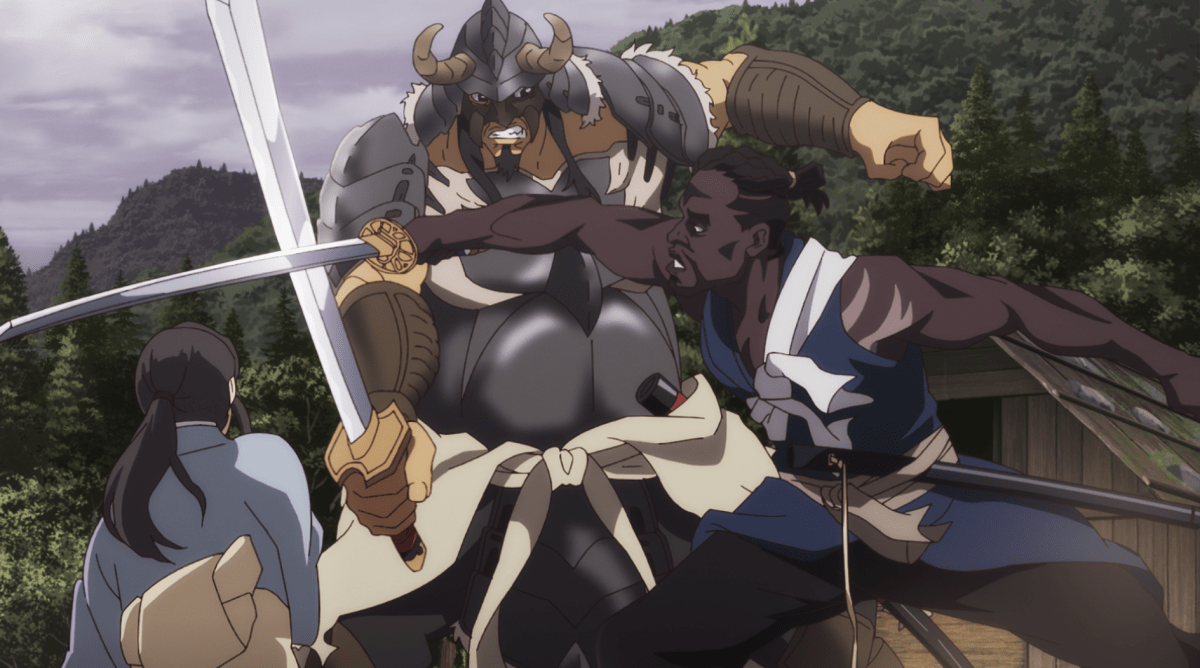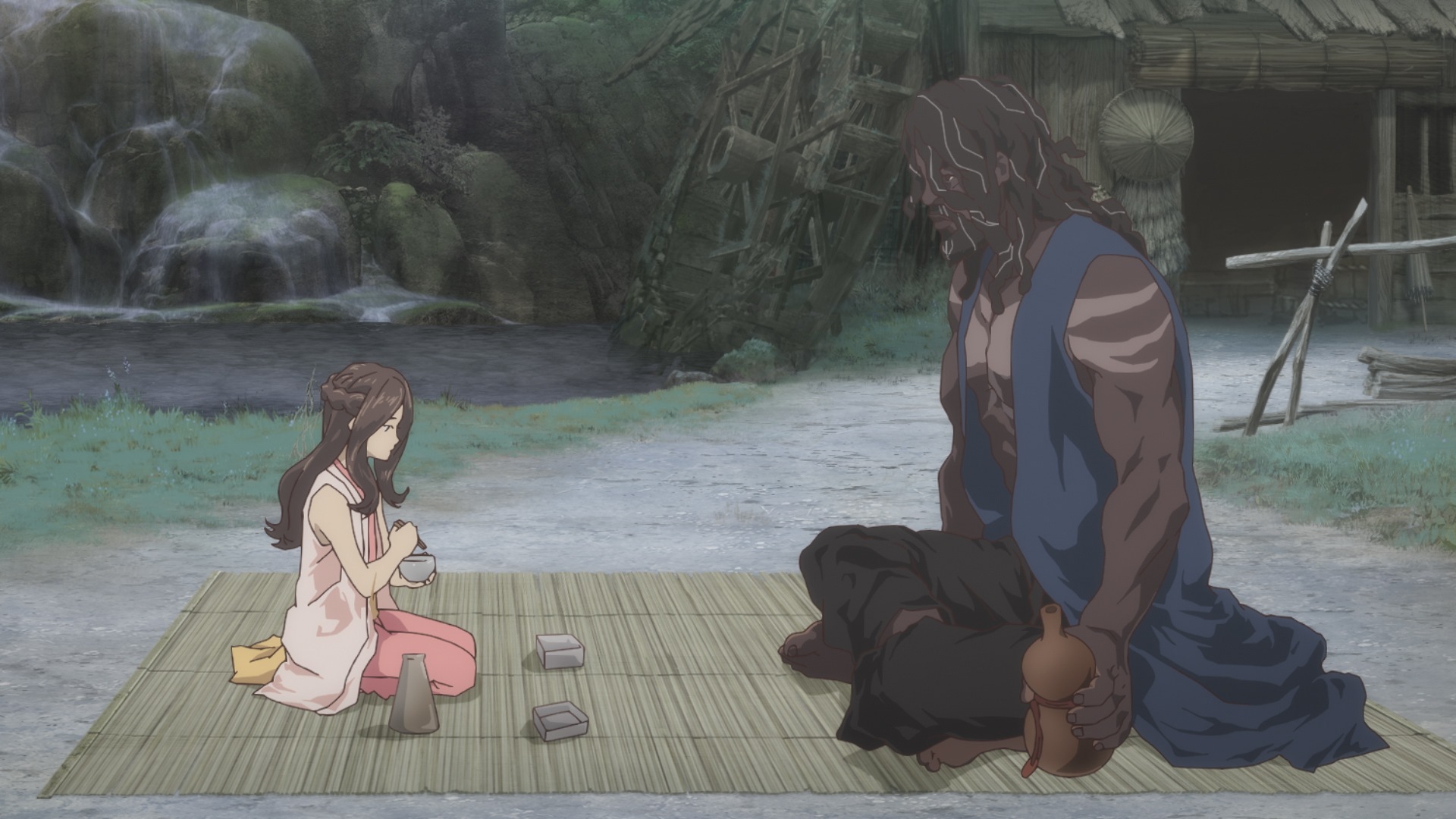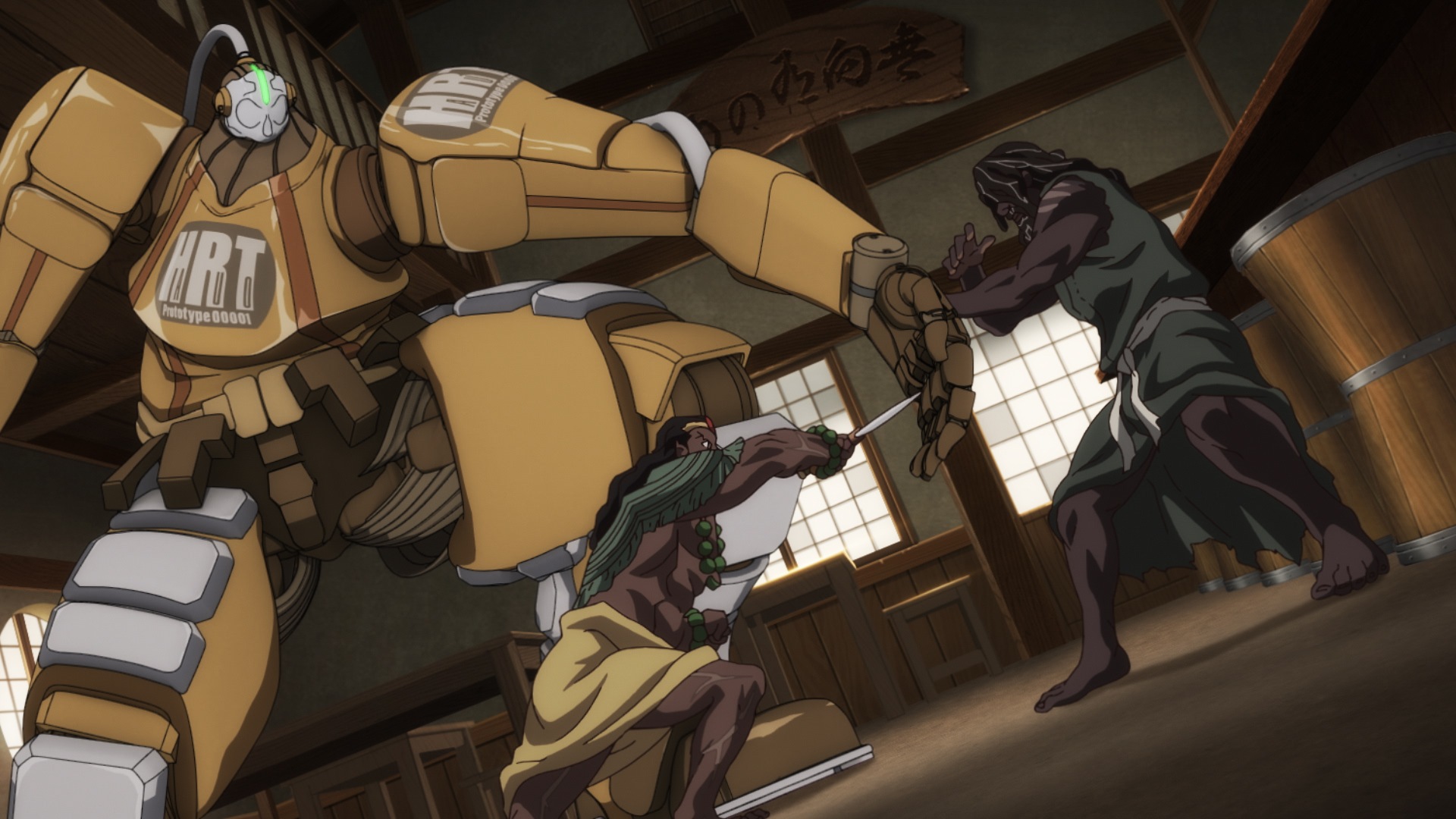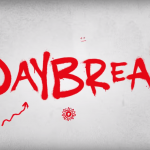“Yasuke” is a Violent, Frenetic, Fantastical (and Fantastic) Story

Based on actual historical figures, Netflix’s newest anime is a violent, frenetic, fantastical story set in an alternate war-torn feudal Japan. Created by LeSean Thomas, the six-episode Yasuke Season 1 follows a retired Black samurai who must pick up his sword again in order to protect a young girl from mysterious forces.
*I was provided with advance screeners for Yasuke Season 1 in exchange for an honest review. All opinions are my own.*
All I knew about Yasuke Season 1 before I started watching was that it features a Black samurai, so I was a bit surprised when the first episode opened with a massive battle that included not only traditional Japanese soldiers but also, basically, magic and robots. (I also got very strong Mortal Kombat vibes from it.) Because the world of Yasuke is one of mechs and magic, where a great lord has dreams of unification.
That lord is Oda Nobunaga, who is actually regarded as the first “Great Unifier” of Japan. Serving at his side as his forces are decimated by a rival daimyo is his faithful Yasuke, who is forced to help his lord commit seppuku before fleeing. We pick up the story 20 years later, when Yasuke lives a humble life as a boatsman, ferrying villagers up and down the river and drinking in the local bar. No one in the village even knows his name.
His simple life is upended when he agrees to ferry Ichika, a young woman who sometimes sings in the bar, north so that she can bring her ill daughter, Saki, to a special doctor. During the journey, they are attacked by a mysterious group of mercenaries (consisting of a Jaeger pilot, the Green Lantern, a werewolf, and the Iron Giant, essentially). It’s then revealed that Saki’s illness is not really an illness, but a powerful spiritual force manifesting.
Yasuke Season 1 has an absolutely amazing premise. I love the concept of this hulking giant of a man playing doting bodyguard to a small wisp of a girl who could knock him flat on his back with a blink, and Yasuke and Saki have a great rapport that definitely helps endear both of them to the audience. My main issue was that the length of the season doesn’t leave much room for character development. We learn a lot about the titular character, obviously, but not much about the other protagonists. Villains are introduced without backstory and don’t last very long, so the emotional payoff when they’re inevitably defeated isn’t as strong.

The narrative bounces back and forth between the present and the past, showing us how Yasuke came to be in Nobunaga’s service but also hinting that the people in the Before and After parts of his life are connected. I love the transitions going into a flashback, which started the scene in a washed-out sepia tone before having color quickly bleed into the frame. The flashbacks are used to explain the kind of man that Yasuke is as well as foreshadow revelations to come.
The disjointed narrative works in the story’s favor. Not having all of the information at once gives you the opportunity to try and piece together the hints, though I will admit that there are some plot threads that don’t seem to go anywhere, or don’t have the importance that I thought they would. There are also some abrupt transitions that had me wondering if there was something missing. One in particular made me convinced I had somehow managed to skip an episode – one episode ends with Yasuke charging towards an army, the next episode starts with Yasuke at the temple discussing battle tactics.
Obviously, racism plays an important role in the story, but honestly not as large as I expected, considering the main character is a Black man in Japan, a country notorious for its, to be polite, isolationism and homogeneous society. There are a few scenes that highlight the colonial aspect of a country like Japan, such as when Nobunaga first meets Yasuke and bestows upon him that name, as he’s unable to pronounce his given name.
Yasuke’s “otherness” is emphasized heavily in the flashback scenes, where his very presence is an affront to the traditionalist samurai he interacts with. But when we see him as a boatsman, the villagers don’t really treat him any differently. They are quick to turn on him later when an antagonist lies that he is a murderer, but they engage his services, and he doesn’t face any trouble from the neighbors. He’s an anomaly, but not an enemy. The village children love him.
It provides an interesting contrast to Yasuke’s view of the world. During his service with Nobunaga, the daimyo is constantly criticized for not only having a Black samurai, but also a female samurai named Natsumaru. (There are also a few hints that he may be in a relationship with his page, Ranmaru, which would not have made him popular among the other daimyo.) Yasuke also, at the time, agrees with Nobunaga’s dream of a unified Japan. However, by the time we meet him 20 years later, he seems to have abandoned that idea. It’s as though after Nobunaga died because he tried to change the old ways, Yasuke has decided that maybe the old ways are the “right” ways after all.
With the characters not getting the attention they deserve, it’s the themes that really take center stage in Yasuke Season 1. The reoccurring themes are power and honor, and the characters have differing (and sometimes evolving) opinions on what those are. But there is also the lingering theme of trauma; Yasuke is continually haunted by Nobunaga’s and Natsumaru’s deaths, and though we don’t know much about where Saki was before this, she is also clearly dealing with something horrible in her past.

As I mentioned, this is a story that could have used more time. Shorter seasons can often lead to tighter narratives, because there is less filler to get through, and the focus can just be on the main story. I appreciate that Yasuke Season 1 left things open-ended, giving room for additional seasons with our hero as a wandering samurai, and with Yasuke’s life during the past 20 years still largely being a mystery there are plenty of opportunities for flashbacks if the series continues. But there really was a lot to process about the whole thing with Saki that definitely needed more than six half-hour episodes.
The mercenaries are never explained – where they come from, how they started working together. When we meet them, they are working for a priest from somewhere in Europe, seeking Saki because of a prophecy. What prophecy? How did he learn about Saki? Where did Saki come from? Who are her parents, because we learn eventually that Ichika is not her mother, just the woman who rescued her from the priest? The main antagonist is referred to simply as Daimyo, but that is a title that was held by many people in feudal Japan. She is who Nobunaga’s forces were fighting against in the opening battle, but where did she come from? What was her goal?
So, yes, I still have a lot of questions about the plot. But Yasuke Season 1 is a great story even without all of the answers. And, in general, it’s a great show. It’s captivating, it’s interesting, it’s well-done. The opening battle is unbelievable. My first few notes are in all capital letters because I was just blown away by the art and the animation. I love the music (composed by Flying Lotus, who also wrote both the opening and ending songs), and the soundtrack is something that really sets Yasuke apart from other more traditional anime.
This is a brutal show, as expected considering the subject matter. People lose limbs, internal organs become external, one character dies in a manner so gruesome that I had to look away. I normally don’t do well with this kind of thing (ironic, from the person who reviews Attack on Titan), but I really was just so fascinated by this entire story. And this series truly shines during its battle and fight scenes.
I really hope we get a season two with Yasuke roaming the Japanese countryside offering his services.
Yasuke begins streaming on Netflix on April 29.
Author: Jamie Sugah
Jamie has a BA in English with a focus in creative writing from The Ohio State University. She self-published her first novel, The Perils of Long Hair on a Windy Day, which is available through Amazon. She is currently an archivist and lives in New York City with her demon ninja vampire cat. She covers television, books, movies, anime, and conventions in the NYC area.
Help support independent journalism. Subscribe to our Patreon.
Copyright © The Geekiary
Do not copy our content in whole to other websites. If you are reading this anywhere besides TheGeekiary.com, it has been stolen.Read our






